Introducing the council we need to be – Andy Begley
Dear Colleague,
The new administration are defining their priorities and the overall direction of the council. I’d like to share with you how the council we need to be will support those objectives.
The council we need to be will be very different from the council of the past. We will become a truly modern, efficient and effective organisation. We will be much more focused on the needs of our residents – our customers – and we will work for the greater good of the people of Shropshire, the people we serve, every single day. We see the potential of new technologies, for example through Artificial Intelligence, voice automation and other innovations so that our services are properly joined up, thereby reducing demand and increasing customer satisfaction.
We will use robust data to properly understand our customers’ needs, so that we can align our resources and people to do what matters most, so that our customers get the right services at the right time.
We are now restructuring the organisation so that our thinking is strategic and that we operate with a ‘one council’ approach, rather than in disconnected silos. We will be able to predict, react and respond to changing customer needs quicker than ever before. And we will become financially sustainable – not just in the sense that we will always balance our books, but in the sense that we can sustain ourselves as an organisation now and in the future.
Much has changed already, and we would like to express our deepest gratitude for your ongoing commitment along this journey. It has not been easy, we acknowledge that. Tough decisions have had to be made, and we will never shy away from doing what we know is right – for our customers, and for us.
Over the past three years, our focus has had to be on reducing our collective spend. It has not been easy – in fact, it’s been almost impossibly difficult. And yet for the last two years we achieved record reductions in spend. The collective achievement has been immense; indeed, almost unprecedented across councils when you consider the savings we have made as a proportion of our budget. Despite everything, everyone should feel an intense sense of pride at what we have achieved. Thank you.
Our financial situation is however still very challenging and will be so for some time to come. But we will only achieve financial sustainability by continuing to change, to become more efficient, more nimble and more cohesive as an organisation.
And, as we have said many times before, that does mean becoming a smaller organisation. Many good people have left the council, and more will in the future. We wish them every success, and thank them for their service.
Redundancies and not filling vacancies are one part of restructuring and resizing. Another, though, is that with change come opportunities. The council we need to be will be the council our customers need.
But it will also be the council that you need. An organisation where you know that your efforts make a difference, and that everything you do has a real, tangible, positive impact for the people we serve.
This new council will be as supportive as ever, but it will also be an organisation with a new and different culture, one where you are free to challenge the status quo, encouraged to think and work differently and better and with innovation. It will be an organisation where silos and barriers are broken down, the treacle removed. It will be a council where you can thrive, where your ideas matter, and where you have every opportunity to further your career.
We all came to work at the council because we believe we can help people: the new council will be one where you will know that you are doing just that.
Thank you.
Andy Begley

What is the council we need to be?
Our shared vision
Our shared vision is simple and clear: to focus on the evolving needs of our customers, so that they get the right services at the right time. This simple vision will guide us through everything we do, every service we provide, every decision we make. We must be a council that exists for the people of Shropshire.
You should have already read and heard about ‘the council we need to be’.
Here, we’d like to explain more about what we mean by that, the challenges we continue to face and the changes we are making, now and in the future.
This is now a key period of change for us. We have a new administration, a new leadership board and the first developments in our new operating model.
The council we need to be
The council we need to be will be a council that works for the people of Shropshire
The position of the new administration is clear: they have a mandate from the people of Shropshire for change and a new approach.
In short, Shropshire Council will be a council that works for the people of Shropshire, not the other way around.
The council we need to be will always focus on the needs of customers and residents.
Focused on the evolving needs of our customers: We will put customers first in everything we do so that they receive the right services at the right time. This means changing how we do things and how we are organised. In some cases, we may stop or reduce some services and redirect resource to where it’s needed to ensure we make the changes we must.
Efficient and effective: We will improve our systems and processes so that we can be more proactive and responsive to customer needs, while eliminating waste and duplication across the organisation
Financially sustainable: We will continue to reduce our spend so that we consistently balance our books. Key to this will in many cases be through reducing demand for our services as well making these more efficient.
The administration’s priorities
The new administration will focus on issues that directly affect our residents. Their initial focus will be on three main priorities which will also help to shape how we approach the council we need to be
Potholes and road repairs: the state of Shropshire’s roads is a major issue for residents, and one which we will work hard to improve.
Making it easier to transact and deal with the council: How our residents contact the council and request services matters hugely to our residents. They expect to be able to contact the council about the services that make their lives better, and for the council to respond and resolve requests and questions quickly and fully.
Resetting the relationship with key partners: Shropshire Council works closely with a wide range of external partner organisations, in particular town and parish councils, to provide services for residents. It is vital to improve these services that we build and maintain strong relationships with our partners, based on mutual respect and trust, where they feel involved and listened to, not done to.
They want to see clear progress on these by the beginning of September.
Far-reaching review of services
We have significant ongoing financial challenges so we have to ensure we meet our legal obligations within the resources we have.
Whilst no firm decisions have yet been made, it’s clear that we will not be able to deliver all the services we currently do – we may not deliver them to the same level or we may not directly deliver them at all.
In meeting the priorities of the administration we are currently reviewing everything we do as a council. Examples include:
- Culture, Leisure & Tourism – it may be that our Town and Parish Councils and other providers are better placed to deliver these in future.
- Keeping local communities tidy (streetscene) – again Town and Parish Councils are keen to take on some of this responsibility as they are closer to their local communities and could respond better to needs that we may be able to.
- Highways – we continue to develop our partnerships to maintain and enhance our road network – this will include a mix of us delivering some of this and our partners, both national and local, delivering on our behalf.
- Customer experience and journey – Our customers receive an improved experience when they contact the council and that this can be in a variety of ways to meet differing needs. This will be based on the principles including: one council approach; data driven and connected; digital by choice not by default; customer centric design.
- Housing – how we work with our Shropshire Towns & Rural Housing, Cornovii Developments and our partners to deliver our housing strategy.
- Social Care – we are constantly reviewing what, how, where, when and at what cost we provide services to our most vulnerable in our communities
- Support Services – we are improving our support services like IT, HR, Finance, Property etc so they are as efficient and effective as possible, meet the needs of our internal customers and maximise the use of technology.
- Third-party spend – Reviewing where we spend the most money on external contracts to make sure these are providing us with the best value i.e. our contract for Waste Services.
- Fees and charges – Reviewing what we charge for our services – increasing income into the council across a number of different areas but if we don’t cover our costs then we look to stop doing this where we can.
Why do we need to change?
There is a political mandate for a new approach, as demonstrated in the results of May’s elections and there is an ongoing organisational need to change, driven by the need to achieve financial sustainability and better manage demand for many services. We simply can’t continue to do everything that we have in the past.
In short, Shropshire Council needs to change so that we can:
(1) deliver the new administration’s priorities (potholes; customer contact; resetting partner relationships);
(2) achieve financial sustainability – there are a number of different ways we can do this.
These different priorities are all connected. By becoming a financially sustainable organisation, we will be able to deliver the new administration’s three key priorities:
• Potholes and road repairs
• Making it easier to transact with the council
• Resetting the relationship with partners
The ongoing financial challenge
Let us make no mistake: our financial pressures are still immense, despite the excellent work that so many of you have put into reducing our spend.
We made just over £47 million in savings in the last financial year.
This is a tremendous achievement: the £47 million we saved represents around 18% of Shropshire Council’s total annual budget. We reduced spend by a higher percentage than almost every other English council. Yet as a council, we finished financial year 24/24 £34 million over budget.
In particular, the rising costs of adult’s and children’s social care continue to cause concern, as they do for most councils across the country. It is important to note that, together, children’s and adult’s services delivered savings of £22 million in 23/24 and a further £27 million in 24/25. This is outstanding, and needs to be recognised as such. We must continue to be laser-focused on financial sustainability and improved service delivery.
The new administration is well aware of the ongoing financial challenges, and is committed to lobbying central government of the consequences of underfunding across social care and the extra pressures of such a rural council as Shropshire.
In short, if we are to become the truly customer-focused council that we need to be, then we must continue to address the financial challenge. To do so means we must continue to take tough decisions.
In particular, increased demand with fewer resources means we need to make decisions about what we:
Make: what do we deliver ourselves
Buy: what do we commission/buy from others to deliver on our behalf
Borrow: how can we join up with others to learn from where they have already changed how they work – this could also include sharing of services
Bot: what can we automate or use AI to help to deliver our services even more efficiently
Stop: if there is no justification to provide a service then we won’t deliver it in future
How will we become the council we need to be?
Shropshire Council is on a journey of change. Over the past two years, our focus has been on achieving financial sustainability by reducing our spending so that we balance the books.
Like many other councils, we continue to need to make substantial savings, becoming a smaller council overall and making the most efficient use of our resources.
However, reducing spend to become financially sustainable is not simply a case of stopping the delivery of certain services, reducing the amount of money we spend with external suppliers, or reducing the wage bill.
Financial sustainability means completely changing and improving how the council works, so that we are more efficient and effective in everything we do, and so that we do not have to keep making further spending reductions in the future.
Neither is it about blindly cutting services or making redundancies.
If we are to become truly financially sustainable, we must have a far-reaching and wide-ranging plan for future success. This means committing to change and that change will be radical.
The changes that we have been making over recent years – and which we will continue to make – are designed to not just reduce spend now, but to create the solid financial foundations upon which we can build the whole organisation.
Self-service and automation for customers
We process many thousands of different customer transactions every year, from applying for Blue Badges to checking the progress of a complaint or a Freedom of Information request. Many existing processes are time-consuming or difficult for customers and staff alike. By moving to a model based on self-service and automation – and using new technologies – wherever possible, we will dramatically reduce our spend, whilst simultaneously providing a more efficient and customer-friendly service to our residents. In short, rather than having to wait in a call queue for a long time or to receive a reply, customers will be able to get the service they need, check progress, and transact with us almost instantly.
Resizing and restructuring
In order to become an organisation that meets the evolving needs of our customers, we must ensure that we have the right people with the right skills, experience and knowledge to provide those services. This means that while some services and teams will remain largely the same, others will change, and others will need to be stopped entirely. The aim is to have a streamlined, efficient organisation that works as ‘one council’, focusing on the areas that we need it to, to enable change.
Improving internal systems and processes
Many of our current systems and processes do not meet the needs of our staff. This needs to change. For example, right now, we are running a series of workshops around payroll and other HR-led internal services. Our staff are customers, too, and we are committed to being efficient and effective internally as well as externally.
Senior management restructure
By abolishing the old directorate structure, we are starting to also abolish silo working. For the first time, senior leaders are now working together to align resources and responsibilities around shared priorities, so that not only do we have a clear direction of travel, we have the ability to get there.
Third Party Spend
We will ensure that we get the best value from the services and products we buy from others. A considerable part of our budget is spent with Third Party Suppliers so we must get the best value from this as possible.
Commercial
We must think more commercially, looking for market opportunities to increase our income by selling more of our services or by raising the fees and charges for our services. This may mean asking ourselves why we provide some services or we do so in a way that doesn’t make us money.
Data-led decisions
In order to provide our customers with the right services at the right time, our decisions will be based on robust data. This will enable us to properly understand what our customers need, and ensure we can align people and resources to those needs, rather than relying on guesswork, however informed it may be.
Using new technologies
New technologies – such as Artificial Intelligence – will enable us to work quicker and more efficiently, reducing the administrative burden on staff and for the customer, so that we can focus on delivering services to our customers.
Our new organisational structure
Our new organisational structure
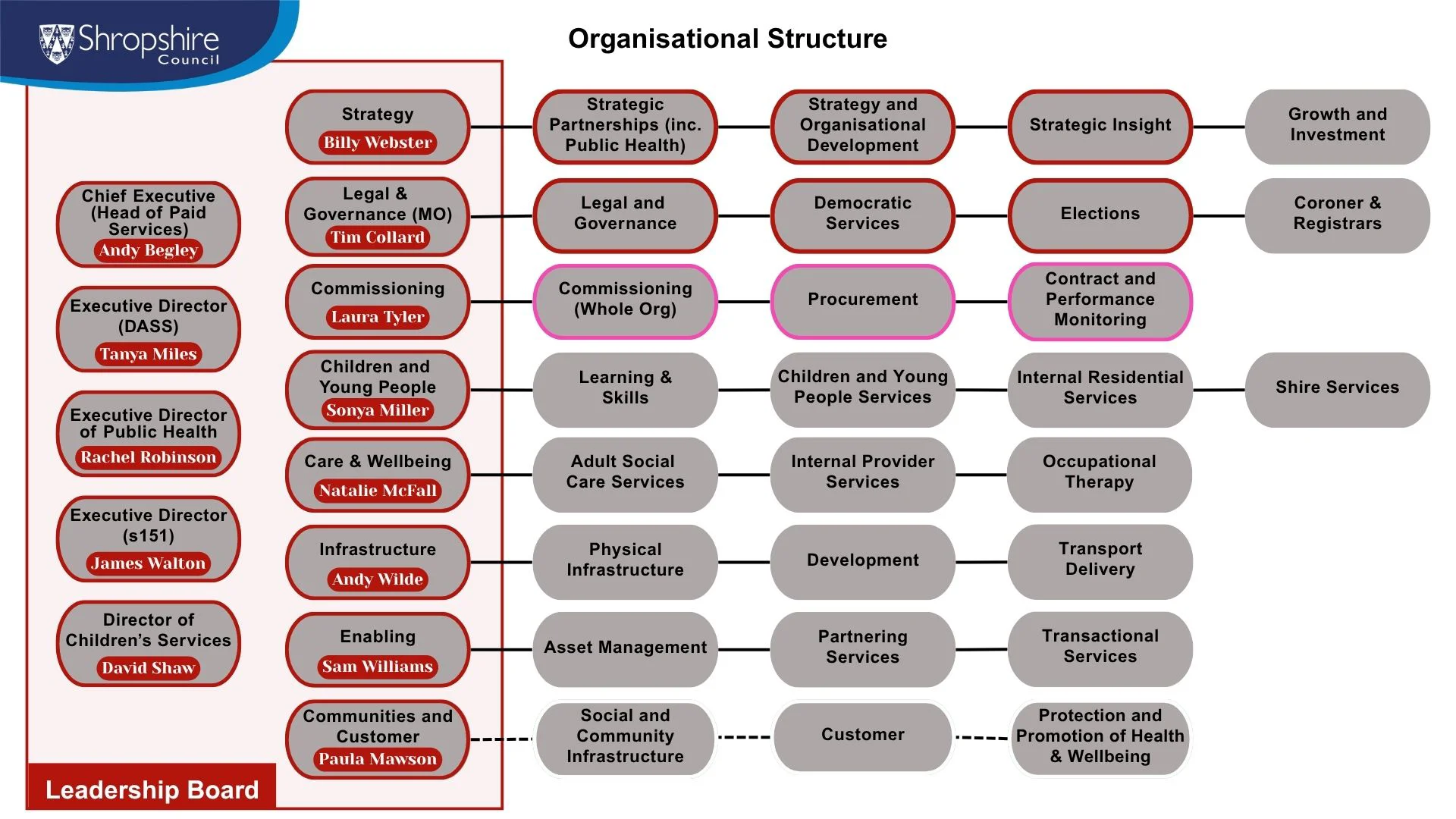
Operating Model Wider Structure
Strategy
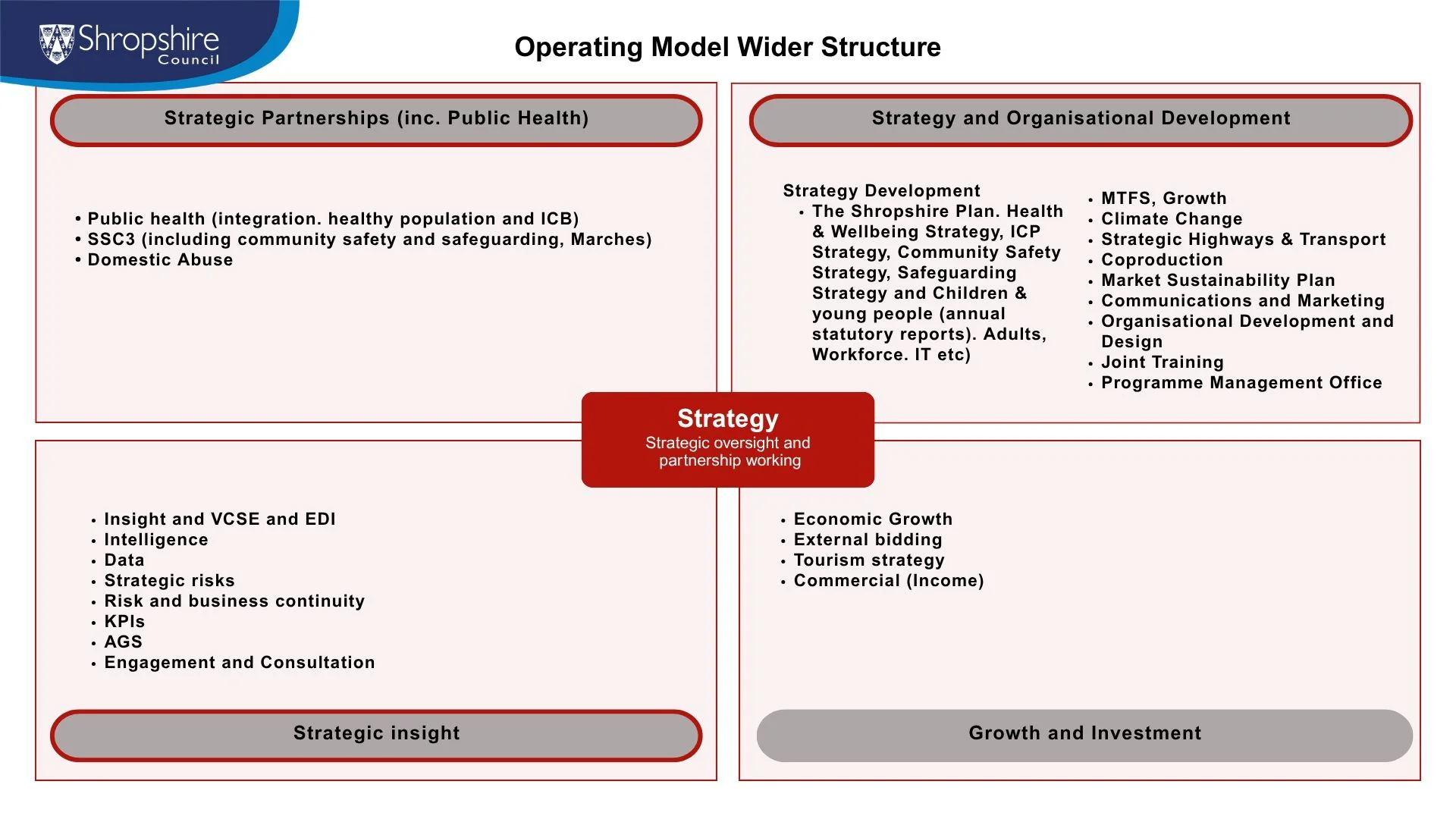
Legal & Governance
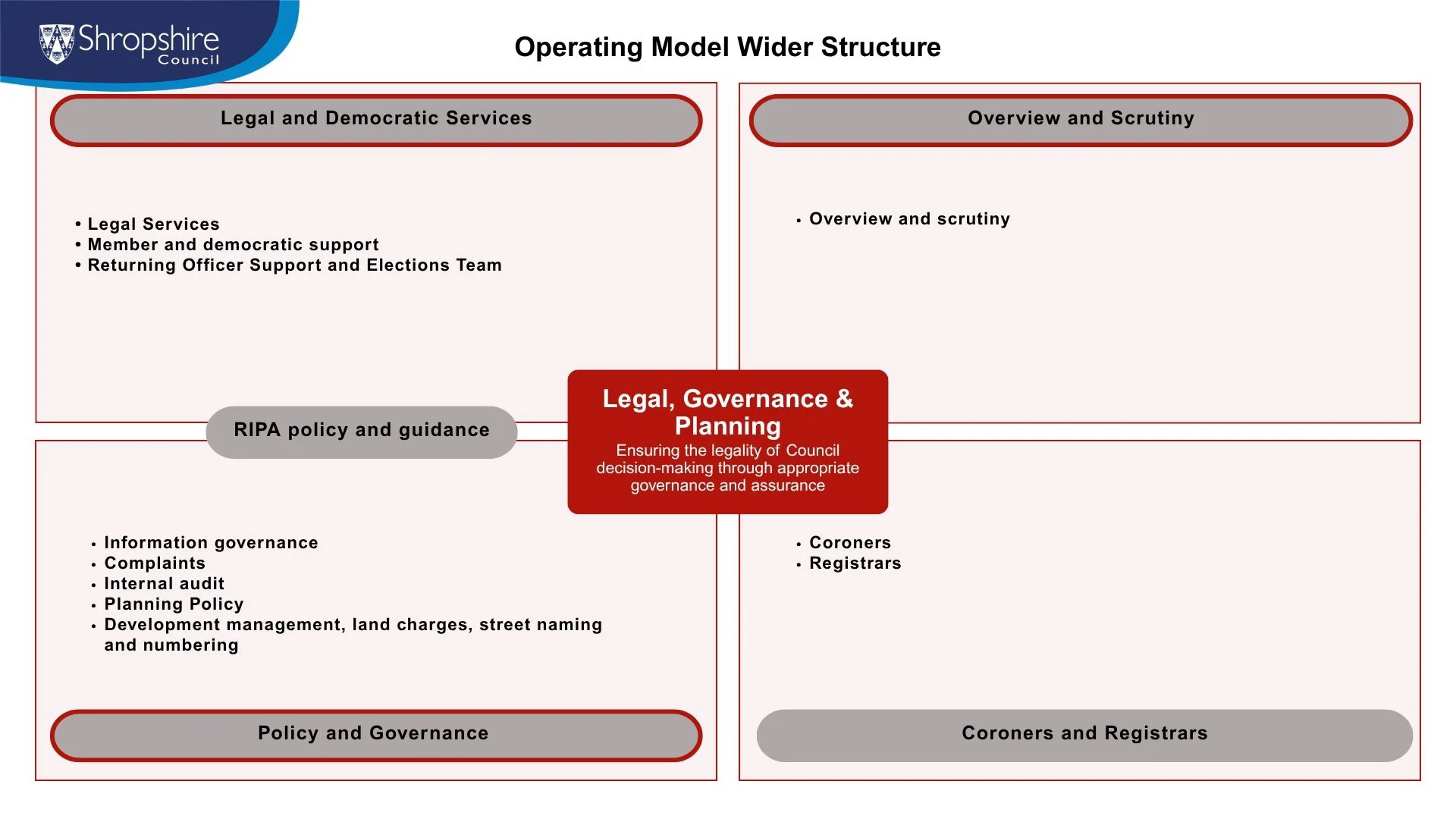
Commissioning
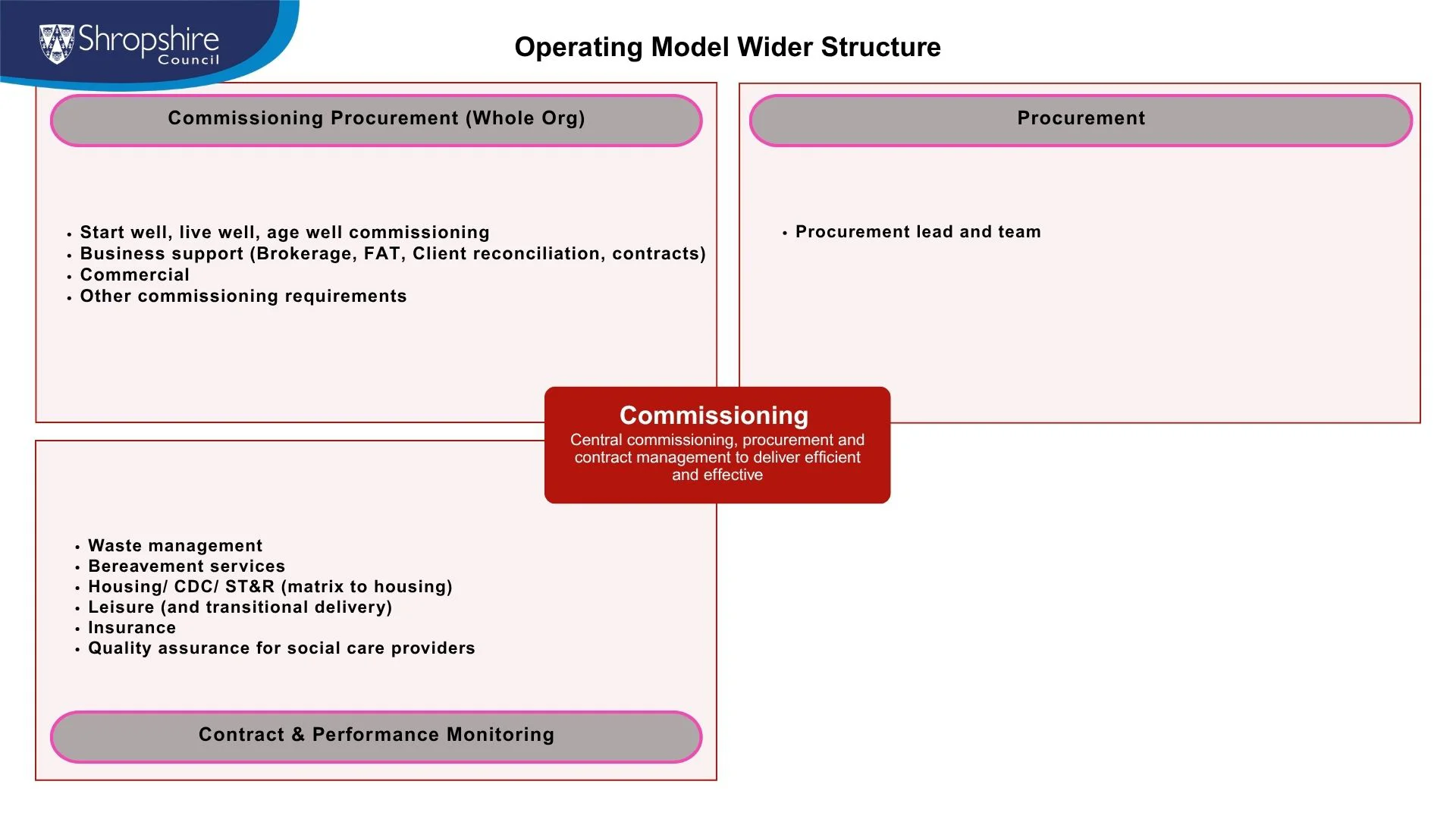
Children & Young People (CYP)
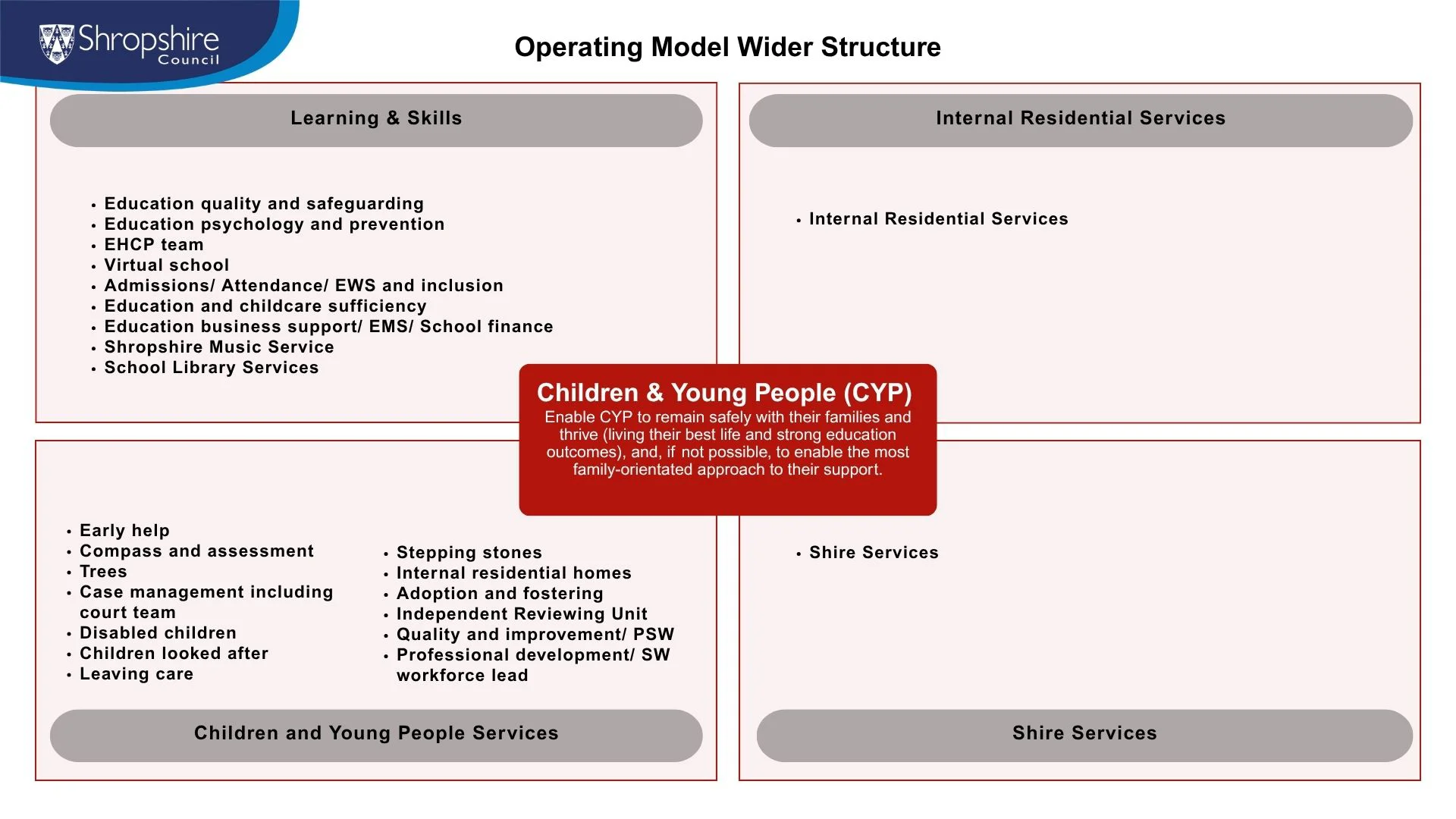
Care & Wellbeing
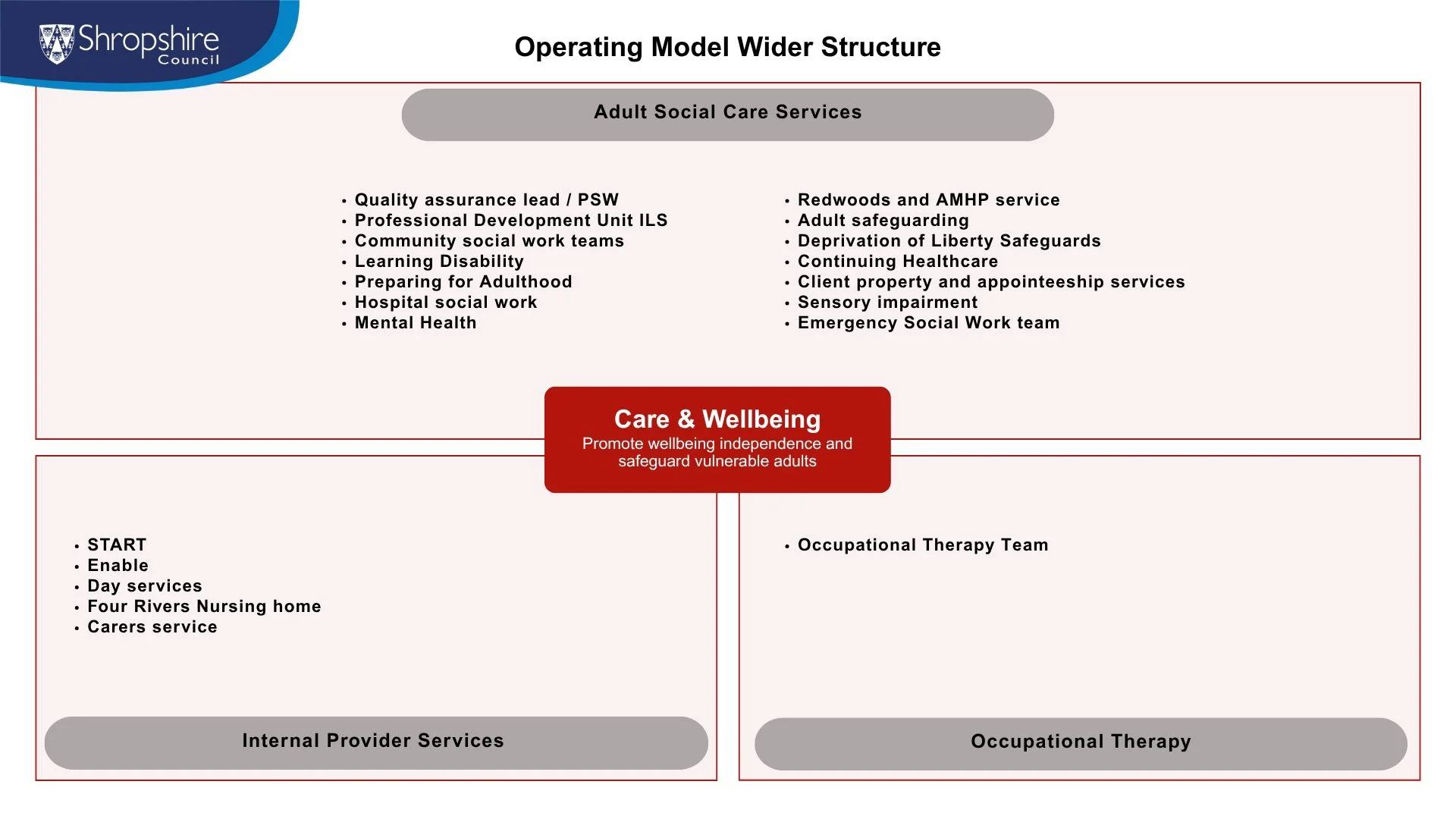
Infrastructure
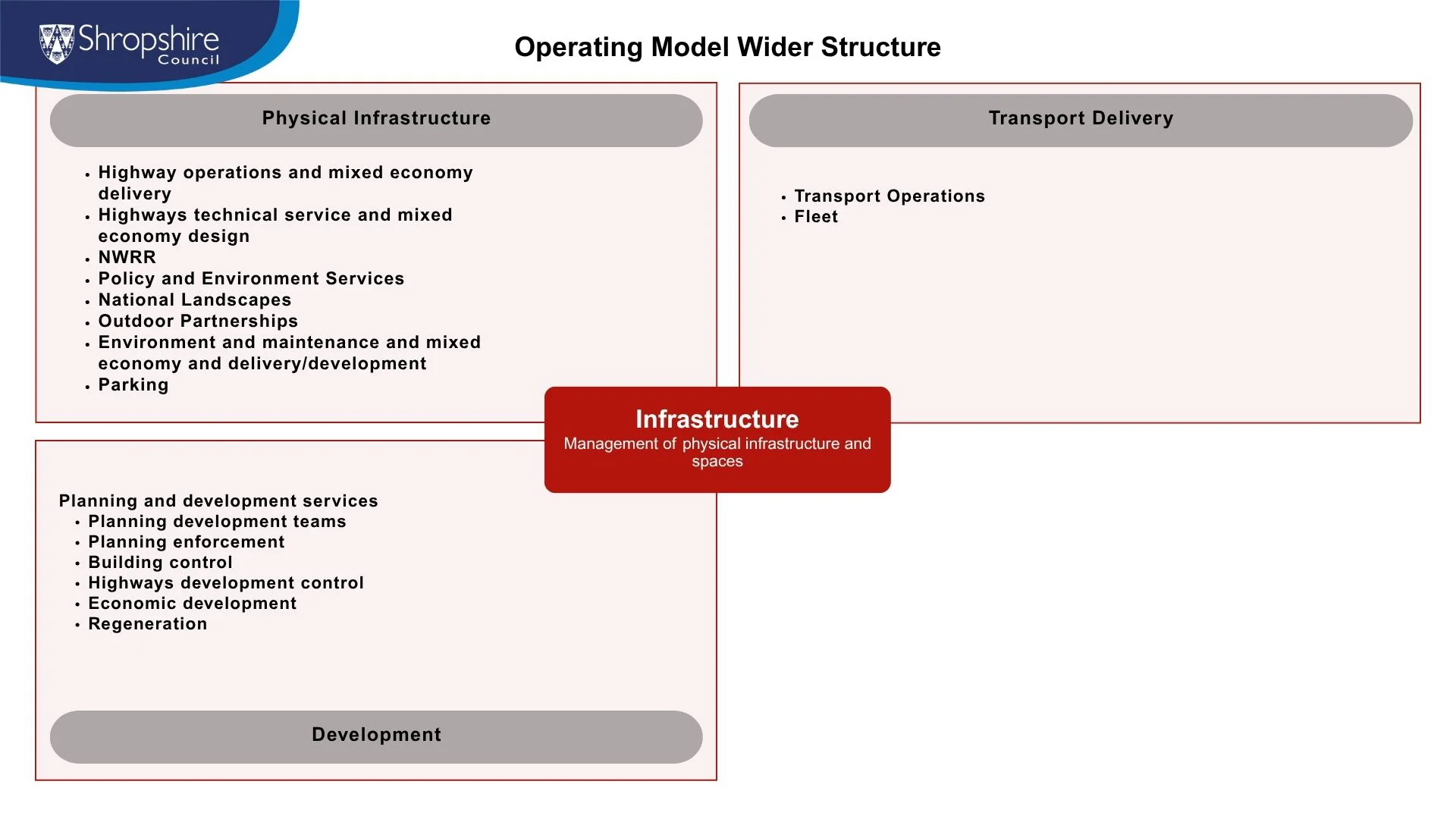
Enabling
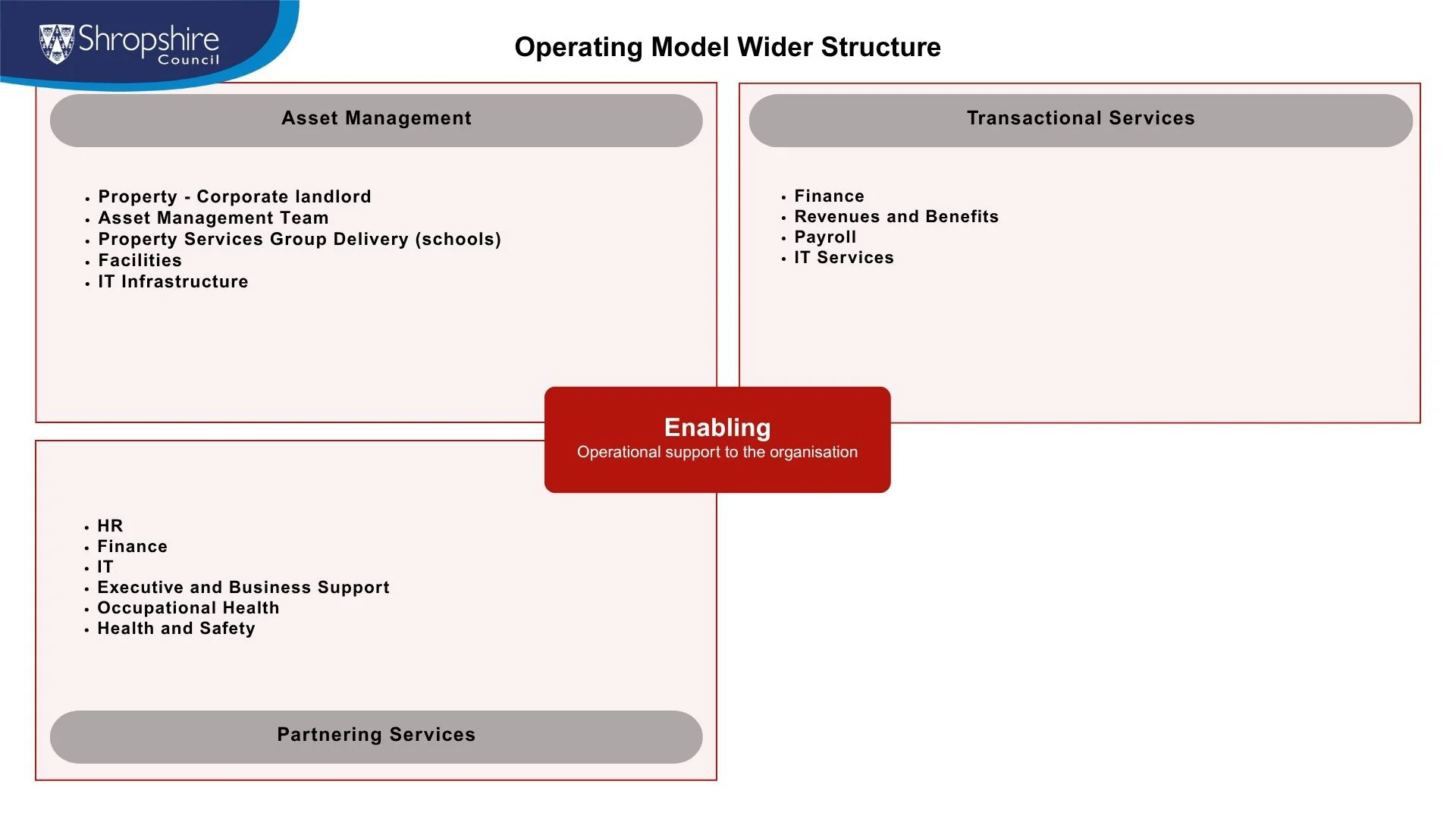
Communities & Customer
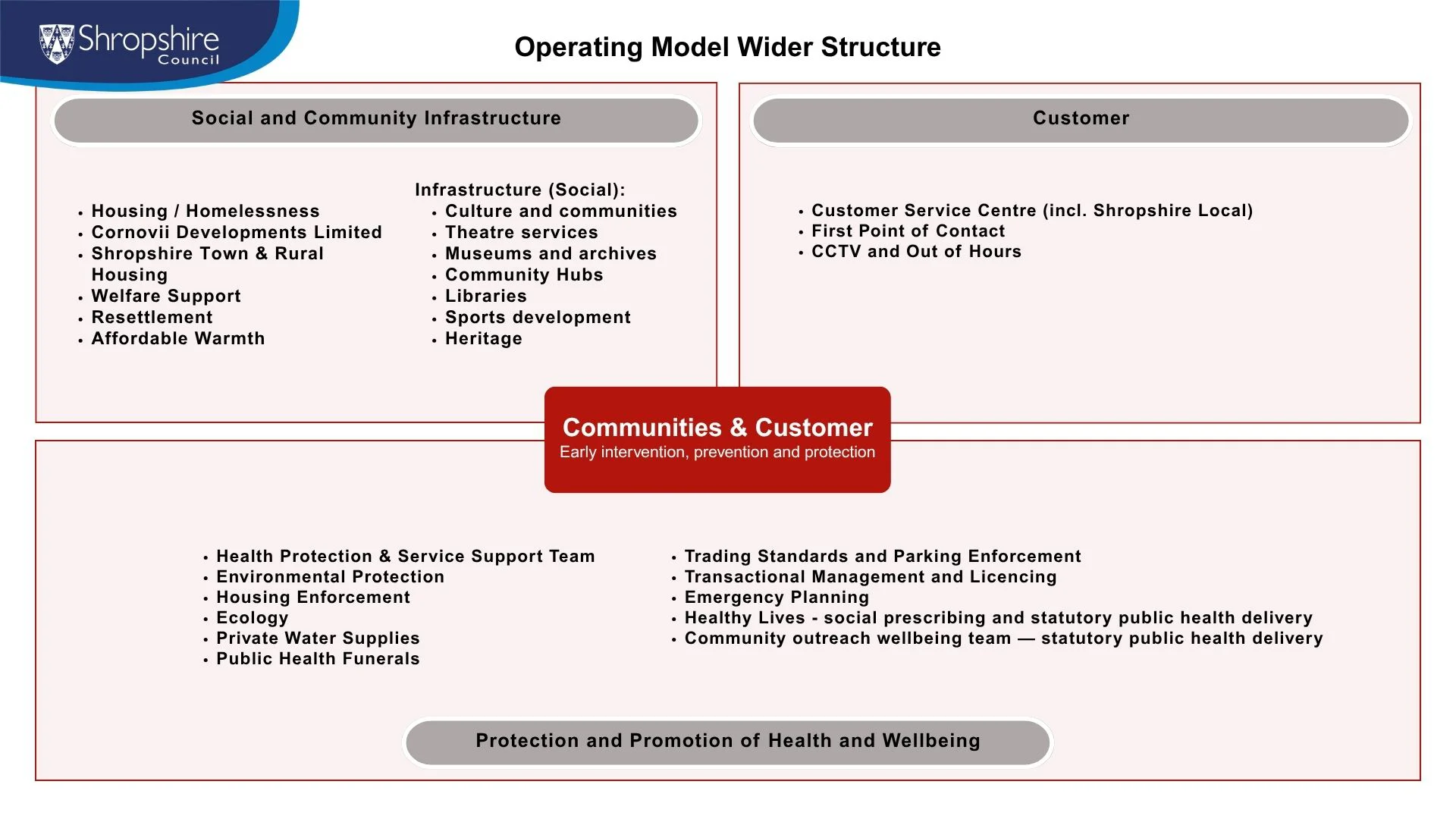
When will we become the council we need to be?
Change is a continuous process of engagement, improvement and evaluation. There is no specific date when we will be able to state that we are now the council we need to be – the needs of our customers will continue to develop, and we need to constantly adapt and evolve ourselves.
Work is ongoing across the council right now. Collectively, we’ve already made many changes to the organisation, especially in terms of reducing spend and rightsizing. This process will continue into 2025 and beyond.
We have a Peer Review taking place in July – this will help us to shape our plans for the future, holding the mirror up and providing advice and guidance from experienced colleagues.
The Shropshire Plan ends this year so we will be working with our new administration over the summer months to review this. They have also been clear on their priorities so we will co-create a Plan that encompasses these priorities, taking account of the resources we have to deliver.
By the end of September we hope to have a first draft of the new plan that we can share with all members and the workforce and there will be the opportunity to engage all staff in a series of workshops to get your views.
All of this will feed into our Budget Setting process in November, so that our resources follow the priorities we have set out. This in turn will then feed into the budget consultation with our residents towards the end of the year.
We hope that we will then be in a position to have a new Shropshire Plan to go to full council for sign off in February next year.
We will develop detailed action plans beneath the plan by April so that it’s clear to everyone what we will, and won’t, be doing in the next 12 months and beyond.
Whilst all this the above is going on we do still need to continue with existing plans so there will be changes coming throughout the year.
There are difficult decisions that will need to be made to ensure that we are financially sustainable but these decisions won’t be made lightly and we will share information on the specific details as soon as this is available.
If you require any of the above information presented in an alternative format please contact the council's communication team on communications@shropshire.gov.uk. You can also download the slides as a PDF here.
